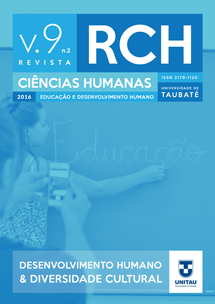A EDUCAÇÃO COMO ESTRATÉGIA DE ELABORAÇÃO: ENTRE MEMÓRIAS E EXPERIÊNCIAS
DOI:
https://doi.org/10.32813/2179-1120.2016.v9.n2.a321Palavras-chave:
Memória, Educação, Segregação.Resumo
O presente artigo objetiva abordar a educação como mecanismo de reconhecimento de determinadas categorias sociais que são historicamente excluídas. Por intermédio da reflexão de cunho sócio-histórico, procura-se demonstrar que a exclusão repetitiva de determinadas categorias sociais não é uma experiência, mas sim fruto de uma memória transmitida de geração em geração. Desta forma perpetua-se a marginalização social de pessoas em função de seus traços diferenciados, no que concerne a uma classe considerada normal. No contexto de instituições que segregam, encontra-se historicamente a escola, que como um aparelho ideológico por excelência, não tem se voltado para elaborar as memórias que reforçam a exclusão. Com isso legados institucionais são assimilados e funcionam para a manutenção da exclusão a medida que fomentam estereótipos e estigmas. Apesar de encontrar-se em uma posição de indiferença em relação aos segregados, a escola pode surgir como um atenuante da exclusão e da segregação, onde, por intermédio da ação da pedagogia democrática, hoje concebida como pedagogia crítica, poderá construir um ambiente de convivência mais harmonioso entre categorias sociais que ainda nos dias atuais, são segregadas.
Métricas
Referências
ADORNO, T. Educação e emancipação. Rio de Janeiro: Paz e Terra, 1995.
ALTHUSSER, L. Aparelhos ideológicos de Estado. Rio de Janeiro: Edições Graal, 1985.
____________. Sobre a reprodução. Petrópolis: Vozes, 1999.
BENTHAM, J. O panóptico. Belo Horizonte: Autêntica, 2008.
BUTLER, J. Quadros de guerra. Rio de Janeiro: Civilização Brasileira, 2015.
CASTEL, R. A ordem psiquiátrica. Rio de Janeiro: Graal, 1978.
DORNELLES, J. R. O que é crime. São Paulo: Brasiliense, 1988.
FOUCAULT, M. História da loucura. São Paulo: Perspectiva, 1996.
____________.Vigiar e punir. Petrópolis: Vozes, 2010.
____________. Microfísica do poder. São Paulo: Graal, 2012.
FREIRE, P. Pedagogia do oprimido. Rio de Janeiro: Paz e Terra, 1970.
FREUD. S. Psicologia de grupo e analise do ego. Rio de Janeiro: Imago, 1976, v.18.
GIROUX, H. A. Os professores como intelectuais. Porto Alegre: Artes Médicas, 1997.
GOFFMAN, E. Estigma. Rio de Janeiro: LTC, 1974.
GOHN, M. G. Educação não-formal, participação da sociedade civil e estruturas colegiadas nas escolas. Revista Ensaio. Rio de Janeiro, v.14, 2006.
GRAMSCI, A. Os intelectuais e a organização da cultura. Rio de Janeiro: Civilização Brasileira, 1982.
JACÓ-VILELA, A. M.; FERREIRA, A. A L; PORTUGAL, F. T. (org.). História da Psicologia. Rio de Janeiro: Nau, 2005.
LOMBROSO, C. O homem delinquente. São Paulo: Ícone, 2007.
MARTINS, E. S. A etimologia de alguns vocábulos referentes à educação. Revista Olhares & Trilhas. Rio de Janeiro, n.6, 2005.
Downloads
Publicado
Como Citar
Edição
Seção
Licença
As publicações da Revista Ciências Humanas estão registradas sob a licença Creative Commons Attribution CC-BY.
1. Os conteúdos dos trabalhos são de exclusiva responsabilidade de seu autor.
2. É permitida a reprodução total ou parcial dos trabalhos publicados na Revista, desde que citada a fonte.
3. Ao submeterem seus trabalhos à Revista os autores certificam que os mesmos são de autoria própria e inéditos (não publicados em qualquer meio digital ou impresso).
4. Os direitos autorais dos artigos publicados na Revista são do autor, com direitos de primeira publicação reservados para este periódico.
5. Para fins de divulgação, a Revista poderá replicar os trabalhos publicados nesta revista em outros meios de comunicação como, por exemplo, redes sociais (Facebook, Academia.Edu, etc).
6. A Revista é de acesso público, portanto, os autores que submetem trabalhos concordam que os mesmos são de uso gratuito.
7. Constatando qualquer ilegalidade, fraude, ou outra atitude que coloque em dúvida a lisura da publicação, em especial a prática de plágio, o trabalho estará automaticamente rejeitado.
8. Caso o trabalho já tenha sido publicado, será imediatamente retirado da base da revista, sendo proibida sua posterior citação vinculada a ela e, no número seguinte em que ocorreu a publicação, será comunicado o cancelamento da referida publicação. Em caso de deflagração do procedimento para a retratação do trabalho, os autores serão previamente informados, sendo-lhe garantido o direito à ampla defesa.
9. Os dados pessoais fornecidos pelos autores serão utilizados exclusivamente para os serviços prestados por essa publicação, não sendo disponibilizados para outras finalidades ou a terceiros.





